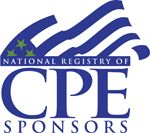 Through its Learning Market website, NASBA presents more than 1,700 continuing-educators and their offerings to the marketplace. It’s a robust group, and how it came together is a topic worth exploring.
Through its Learning Market website, NASBA presents more than 1,700 continuing-educators and their offerings to the marketplace. It’s a robust group, and how it came together is a topic worth exploring.
The providers on Learning Market are members of the National Registry of CPE Sponsors, which was developed in 1990 by NASBA. The Registry’s members are program sponsors who provide CPE programs
in accordance with the Statement of Standards for CPE Programs, or Standards. That document was created — and is currently being revised — by both NASBA and the AICPA.
Most state boards of accountancy require CPAs to earn a set number of CPE credits annually, and they also require or accept credits that come from a Registry member. That’s why being on the Registry is very important to CPE providers, and why accountants exploring their continuing-education options use that membership as a starting point.
“The Registry serves as a fiduciary for the state board in assuring quality continuing professional development programs for CPAs,” said Jessica Luttrull, Manager-National Registry. “The chief benefits of the Registry are that it provides uniformity in the development of continuing-education programs, that it is national in scope and that it protects the public interest by improving the overall quality of CPE.”
The Registry is continually changing in that new members join regularly. More than 90 percent of existing members renew every year, and in 2011 NASBA has seen a sharp uptick in interest.
“It’s becoming the place to be,” Luttrull said. “Between August and October 2011, we added 65 new sponsors. We’ve been working to make the application process more streamlined, so that they can get through it quicker, and we are seeing the results of that and other process enhancements we’ve been making in the last year.”
The membership requirement by many state boards is a major reason why providers want to be on the Registry. And even in states that don't require membership, having it usually means that the provider doesn’t have to go through an additional approval process to offer its products in that state. Or if they do, Luttrull said, it’s usually an abbreviated or expedited process for Registry Sponsors.
“Texas has a separate registration process, but if you’re a NASBA Sponsor, you don’t have to go through the actual review or application process, but just pay the registration fee,” she said. “Saving that kind of time and duplication at the state level is very valuable to the Sponsors.”
Look for even more enhancements in 2012, as the final revised version of the Standards is released and further work is done on various programs within the Registry itself. That will include changes to the Quality Assurance Service, or QAS, program, which was established by NASBA in 1998 and focuses on approval of CPE providers who offer self-study courses.
“The QAS is separate from the Registry, but there are six states that require CPAs who want to take self-study programs to do so from a QAS provider,” Luttrull explained. “And so we believe that with the revisions to the Standards there’ll be some administrative streamlining in the QAS program, and that will be exciting for the Sponsors who are already providing self-study courses, and for those who want to begin doing so.”
